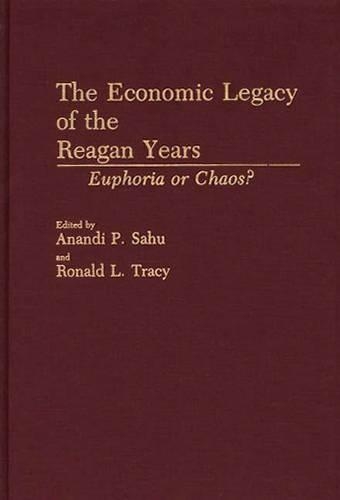
The Economic Legacy of the Reagan Years: Euphoria or Chaos
(Hardback)
Publishing Details
The Economic Legacy of the Reagan Years: Euphoria or Chaos
By (Author) Anandi P. Sahu
By (author) Ronald L. Tracy
Bloomsbury Publishing PLC
Praeger Publishers Inc
30th April 1991
United States
Classifications
Tertiary Education
Non Fiction
Political economy
338.973
Physical Properties
Hardback
296
Description
The eight years of the Reagan administration have left an indelible imprint on U.S. economic policy. Although the term Reaganomics is employed by both the general public and academic economists, there is still no consensus as to what the overall impact of Reaganomics has been for the country. This work, a wide-ranging collection of essays and commentaries, analyzes the empirical evidence that comprises the Reagan economic legacy. By detailing that legacy's successes, such as low unemployment and economic growth, and its negative effects, including unprecedented deficits and regulatory chaos, the editors provide some tentative conclusions as to whether the Reagan years produced an economic miracle or paved the way for economic disaster. The volume concentrates on the first level of economic impacts, covering the issues of supply-side economics, the regulatory environment, monetary policy, and foreign trade. Under each topic, groups of essays and commentaries present alternative interpretations of the Reagan legacy. Tax policy and business fixed investment, the effects of supply-side policies on labor supply, tax reform and deregulation are addressed in the supply-side section; interest rates and monetary policy objectives and realizations comprise the monetary policy section; and trade policy, trade deficit, and exchange rates are discussed in the international trade section. A final essay offers an alternate view of the Reagan legacy that attempts to synthesize the divergent theories. This work will be an important new resource for courses in economics and political science, as well as a worthy addition to college, university, and public libraries.
Reviews
Respected economists including A. Deardorff, G. Burtless, D. Fullerton, T. Moore, and M. Seger (Federal Reserve Governor) examine the stimulative fiscal policy, the tight monetary policy, the deregulation of banking and other industries, and the international trade consequences of the Reagan administration. Among their conclusions: supply-side tax cuts stimulated a slight increase in investment and a small rise in the labor supply; attempts to restrain budget deficits and federal spending failed; deregulation was less rapid than during the Carter years because fewer industries remained to deregulate; and monetary policy reduced inflation but high real interest rates persisted. Tax cuts, budget deficits, and tight monetary policy converted a small trade surplus into a large trade deficit. A major Reagan contribution was the shift to economic optimism and an appreciation of the virtues of markets. The New Deal notion that ever-rising taxes and spending could solve social and economic problems was seriously challenged. Reagan's firm conviction that America's economic problems are not caused by excessively low federal taxes and spending decisively shifted the fiscal debate. A worthwhile addition to the growing literature assessing the economic policies of the Regan administration. Upper-division undergraduate and graduate collections.-Choice
"Respected economists including A. Deardorff, G. Burtless, D. Fullerton, T. Moore, and M. Seger (Federal Reserve Governor) examine the stimulative fiscal policy, the tight monetary policy, the deregulation of banking and other industries, and the international trade consequences of the Reagan administration. Among their conclusions: supply-side tax cuts stimulated a slight increase in investment and a small rise in the labor supply; attempts to restrain budget deficits and federal spending failed; deregulation was less rapid than during the Carter years because fewer industries remained to deregulate; and monetary policy reduced inflation but high real interest rates persisted. Tax cuts, budget deficits, and tight monetary policy converted a small trade surplus into a large trade deficit. A major Reagan contribution was the shift to economic optimism and an appreciation of the virtues of markets. The New Deal notion that ever-rising taxes and spending could solve social and economic problems was seriously challenged. Reagan's firm conviction that America's economic problems are not caused by excessively low federal taxes and spending decisively shifted the fiscal debate. A worthwhile addition to the growing literature assessing the economic policies of the Regan administration. Upper-division undergraduate and graduate collections."-Choice
Author Bio
ANANDI P. SAHU is Assistant Professor of Economics at Oakland University. RONALD L. TRACY is Associate Professor and Chairman of the Department of Economics at Oakland University.
